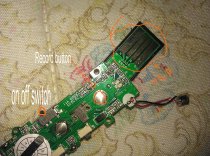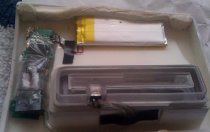Verifone VX670 skimmer software
 If you hand your credit or debit card to a merchant who is using a wireless point-of-sale (POS) device, you may want to later verify that the charge actually went through. A top vendor of POS skimmers ships devices that will print out “transaction approved” receipts, even though the machine is offline and is merely recording the customer’s card data and PIN for future fraudulent use.
If you hand your credit or debit card to a merchant who is using a wireless point-of-sale (POS) device, you may want to later verify that the charge actually went through. A top vendor of POS skimmers ships devices that will print out “transaction approved” receipts, even though the machine is offline and is merely recording the customer’s card data and PIN for future fraudulent use.
This skimmer seller is a major vendor on one of the Underweb’s most active fraud forums. Being a “verified” vendor on this fraud forum — which comes with the stamp of approval from the forum administrators, thus, enhancing the seller’s reputation — costs $5, 000 annually. But this seller can make back his investment with just two sales, and judging from the volume of communications he receives from forum members, business is brisk.
This miscreant sells two classes of pre-hacked wireless Verifone POS devices: The Verifone vx670, which he sells for $2, 900 plus shipping, and a Verifone vx510, which can be had for , 500. Below is a video he posted to youtube.com showing a hacked version of the vx510 printing out a fake transaction approval receipt.

From the seller’s pitch: “POS is ‘fake’ and stores D+P [card data and PIN], prints out approved receipt or can be setup for connection error. Software to decrypt the data is provided. It keeps d+p inside memory for manual retrieval via USB cable.”
These types of hacked POS systems, known as “offline POS skimmers” in the Underweb, are marketed for suggested use by miscreants employed in seasonal or temporary work, such as in restaurants, bars or retail establishments.
The fraudster selling these skimming devices also sells regular ATM skimmers, including a skimmer model that was featured in an earlier post on KrebsOnSecurity. That device, made to fit over the card slot on certain models of Diebold Opteva ATMs, records the data stored on the magnetic stripe of a card using a disassembled MP3 player. Below is a close up that the skimmer seller provides to customers, showing the MP3 player circuit board used in his skimmers. This is part of a card skimmer that is sold with a hidden camera that is built into a false panel made to be affixed directly above the cash machine’s PIN pad.
The stolen card data from this Opteva skimmer is stored as an MP3 file, and can only be decoded with special software. To hear what those audio files sound like, check out this sample, which the skimmer seller supplies to customers who ask for instructions on decoding the MP3 files.






